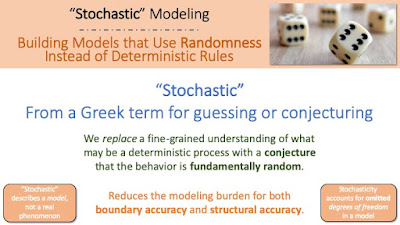It seems like there is a lot of confusion in quantitative modeling circles over the relationship between "randomness" and "stochasticity." This is in large part because the success of stochastic models to make sense of the world around us has led to wide use of stochastic modeling, so much that "stochastic" has become a near synonym for "random." However, the two terms are not identical.
 |
| Slide from SOS 212 (Systems, Dynamics, and Sustainability), an introductory modeling course I teach |
"Stochastic" is a term originating from Greek for "guess" or "conjecture." It describes a modeling technique to simplify a model by assuming (guessing/conjecturing) that the system being modeled is random, even if it is not. In other words, rather than having to account for a wide range of degrees of freedom that might be necessary to specify how a system is going to evolve, you substitute all of that detailed deterministic modeling with a crude approximation of the outcome being "random". The modeling burden then shifts from getting everything right down to high levels of precision to shaping the probability distributions to best match the outcomes that are most likely, regardless of what the underlying mechanism is. So a "stochastic model" is one that describes a system using randomness regardless of whether there is any reason to believe that the randomness is fundamental. It is a modeling trick to add analytically tractability to models that would otherwise be prohibitively complex to be useful.
So you shouldn't refer to phenomena themselves as being "stochastic." It is OK to say that the phenomena is random (if you really believe that). Or it is OK to say you use a stochastic model to describe the system (which implies that you will use randomness in order to omit a large number of degrees of freedom, thus making the model "simpler"). But you shouldn't use "stochastic" as a synonym for "random."

No comments:
Post a Comment